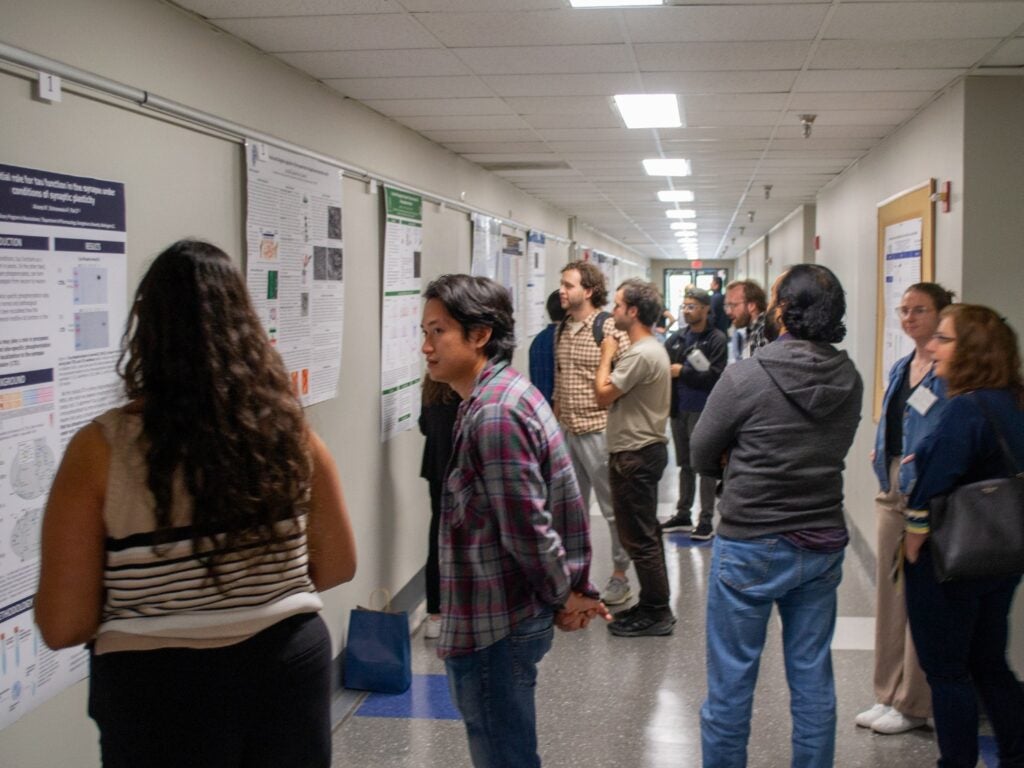Wednesday, October 11

Since 1985, Student Research Day has provided an on-campus forum for students to showcase their research pursuits. For students in the Ph.D. programs at the Georgetown University Medical Center, the day offers the opportunity to share their dissertation research with their colleagues from other disciplines while engaging in discussion and soliciting feedback.
Student Research Day is open to all current graduate students in these Ph.D. programs: Biochemistry and Molecular & Cellular Biology; Biology; Cell Biology; Chemistry; Global Infectious Disease; Microbiology & Immunology; Neuroscience; Pharmacology; Physics; Psychology; Physiology & Biophysics; Tumor Biology.
Quick Links
Schedule
| October 11 | Event |
|---|---|
| 10 a.m.-12:30 p.m. | Oral Presentations Medical and Dental Building, SW107 |
| 1-2 p.m. | Keynote Speaker: Dr. Avindra Nath – “The longevity of COVID, why it occurs and what can we do about it” Medical and Dental Building, Harvey Amphitheater South |
| 2:30-4:30 p.m. | Poster Presentations Preclinical Science Building, Hallway C Posters will be available for viewing throughout the day and during the reception. |
| 4:30-6 p.m. | Reception and Announcement of Presentation Winners Preclinical Science Building, Hallway C |
Keynote Speaker

Dr. Avindra Nath
Director, Translational Neuroscience Center at National Institute of Neurological Disorders and Stroke (NINDS)
“The longevity of COVID, why it occurs and what can we do about it”
Dr. Avindra “Avi” Nath received his M.D. from Christian Medical College in India, followed by a residency and fellowship at the University of Texas Health Science Center in Houston. He was a faculty member at the University of Manitoba, University of Kentucky, and Johns Hopkins University. Today he is a world-renowned neurologist and the clinical director at the National Institute of Neurological Disorders and Stroke (NINDS).
He began his career amid the AIDS epidemic, where he began to observe subtle cognitive changes in his patients battling HIV. Dr. Nath was one of the first to push for the discovery of how these viral infections affect the nervous system and understanding how the CNS can act as a reservoir and play a role in HIV-associated neurological disorders (HAND). Dr. Nath’s clinical skills have made him a leader in understanding the neuropathogenesis of viral infections including Ebola, Zika, and most recently COVID-19. Today, he has found significant changes to blood vessels and neurons in deceased COVID patients and works to unravel the pathology of “long COVID.”
Join us at our Keynote speech to learn more about how the battle with COVID-19 still rages long after contracting the virus, and what we can do to combat it.

Submit an Abstract
The deadline for abstract submission has passed.
Abstracts will be accepted on a first come, first served basis due to a limited number of poster and oral presentation slots. You will receive an email from the Medical Center Graduate Student Organization (MCGSO) indicating whether your abstract has been accepted and which presentation format you have been assigned.
First-year Ph.D. students who have completed a rotation project are welcome to present their data in a poster format. There will be slots separate from poster and oral presentations allotted to first-year Ph.D. students.
Students may only submit one abstract for Student Research Day. Students must be the principal investigator/primary author for the abstract that is submitted. Once an abstract is submitted, it will be considered the FINAL version to be used for the event. Revised abstracts will not be accepted.
Presentations
Posters
Once you have received an email from MCGSO confirming the acceptance of your abstract for a poster presentation, you will need to ensure that your poster is prepared. Keep in mind that like your abstract, your poster and poster presentation should be geared toward a general science audience.
If you have a poster already printed from a recent meeting, you are welcome to use it. Please send us the dimensions of your poster so we can reserve adequate space for you. If you are creating a new poster, we may* be able to assist in the cost of poster printing (*to be determined). You will receive details about poster specifications and deadlines in your confirmation email.
As we draw closer to Student Research Day, you will receive further instructions regarding poster placement, evaluations, and schedules for attending your poster.
Oral Presentations
The oral presentation sessions will consist of a series of 10-minute talks with PowerPoints, followed by 5 minutes for questions and transition. If you are interested in presenting your research in an oral format, be sure to indicate this during abstract submission. Only a select number of abstracts will be chosen for oral presentations.
Oral presentations should be geared to a general science audience.
Presentation Evaluation
Poster and oral presentations will be evaluated for the following categories: background/introduction, hypothesis or objective, methods, results, conclusion or discussion, future work, overall presentation and handling of questions, and quality of the poster or PowerPoint presentation.
Call for Judges
We are seeking faculty, staff and postdocs to give feedback and scores for students’ oral and poster presentations.
